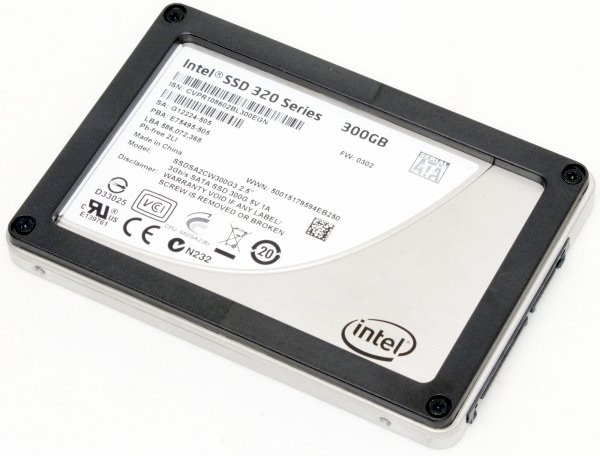Intel announces third-generation SSD and the new 320 Series is the first of the company’s drives to use 25nm MLC NAND chips which also enabled capacities up to 600GB.Intel SSD 320 Series drives is positioned as a mainstream desktop and notebook SSD and because it uses the same controller chip as the old X25-M………
Intel Corporation announced its highly anticipated third-generation solid-state drive (SSD) the Intel Solid-State Drive 320 Series (Intel SSD 320 Series). Based on its industry-leading 25-nanometer (nm) NAND flash memory, the Intel SSD 320 replaces and builds on its high-performing Intel X25-M SATA SSD. Delivering more performance and uniquely architected reliability features, the new Intel SSD 320 offers new higher capacity models, while taking advantage of cost benefits from its 25nm process with an up to 30 percent price reduction over its current generation.“Intel designed new quality and reliability features into our SSDs to take advantage of the latest 25nm silicon, so we could deliver cost advantages to our customers,” said Pete Hazen, director of marketing for the Intel Non-Volatile Memory (NVM) Solutions Group. “Intel’s third generation of SSDs adds enhanced data security features, power-loss management and innovative data redundancy features to once again advance SSD technology. Whether it’s a consumer or corporate IT looking to upgrade from a hard disk drive, or an enterprise seeking to deploy SSDs in their data centers, the new Intel SSD 320 Series will continue to build on our reputation of high quality and dependability over the life of the SSD.”
The Intel SSD 320 is the next generation of Intel’s client product line for use on desktop and notebook PCs. It is targeted for mainstream consumers, corporate IT or PC enthusiasts who would like a substantial performance boost over conventional mechanical hard disk drives (HDDs). An SSD is more rugged, uses less power and reduces the HDD bottleneck to speed PC processes such as boot up and the opening of files and favorite applications. In fact, an upgrade from an HDD to an Intel SSD can give users one of the single-best performance boosts, providing an up to 66 percent gain in overall system responsiveness.The Intel SSD 320 Series comes in 40 gigabyte (GB), 80GB, 120GB, 160GB and new higher capacity 300GB and 600GB versions. It uses the 3 gigabit-per-second (3gbps) SATA II interface to support an SSD upgrade for the more than billion SATA II PCs installed throughout the world. Continuing to offer high-performing random read and write speeds, which most affect a user’s daily computing experience, the Intel SSD 320 produces up to 39,500 input/output operations per second (IOPS) random reads and 23,000 IOPS random writes on its highest-capacity drives. In addition, the company has more than doubled sequential write speeds from its second generation to 220 megabytes-per-second (MB/s) sequential writes and still maintains one of the highest read throughputs at up to 270 MB/s sequential reads. This greatly improves a user’s multitasking capabilities. For example, a user can easily play background music or download a video, while working on a document with no perceivable slow down.
Already one of the most solid-performing SSDs over time, Intel continues to raise the bar on SSD reliability in the way it has architected its third generation, using proprietary firmware and controller, to further demonstrate that not all solid-state drives are created equal. In this rendition, Intel creatively uses spare area to deploy added redundancies that will help keep user data protected, even in the event of a power loss. It also includes 128-bit Advanced Encryption Standard capabilities on every drive, to help protect personal data in the event of theft or loss.“Solid-state drives continue to be one of the hottest trends in computing,” said Bernard Luthi, vice president of marketing, Web management and customer service at leading e-retailer Newegg.com. “Intel remains a top brand because of its consistent performance and extremely low return rate. We are sure customers will welcome the new higher capacity drives, and now is a great time for consumers to upgrade their PC to a fast new SSD.”Intel SSD 320 prices, based on 1,000-unit quantities, are as follows: 40GB at $89; 80GB at $159; 120GB at $209; 160GB at $289; 300GB at $529 and 600GB at $1,069. Check retailers/e-tailers for consumer pricing. All models include a limited 3-year warranty from Intel.
“With recent announcements, we have expanded our SSD product line and now offer both consumers and computer OEMs more SSD choices,” said Tom Rampone, vice president and general manager, Intel NVM Solutions Group. “We see the Intel SSD 320 as a solid advancement to our SSD roadmap, and will continue to upgrade and refresh our SSD product line as we add more enterprise options for our business customers throughout the year.”Another benefit for Intel SSD purchasers is the Intel SSD Toolbox with Intel SSD Optimizer, a free utility which provides Microsoft Windows users with a powerful set of management, information and diagnostic tools to help maintain the health and out-of-box performance of the drive. To help ease the installation process, all Intel SSD users can download the free Intel Data Migration Software to help clone the entire content of a previous storage drive (SSD or HDD) to any Intel SSD.Intel SSDs can be purchased in the United States from such retailers as Best Buy or Fry’s Electronics, plus a variety of resellers, retailers or Internet e-tailers such as Newegg.com or Amazon.com worldwide.

